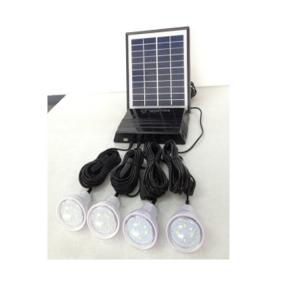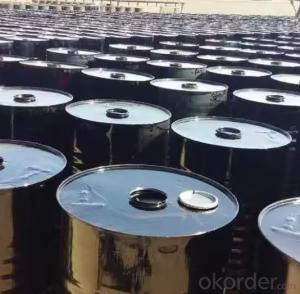4w 10w 20w 50w 80w 100w Solar Lighting System With Mobile Charge 4 LED Bulbs 4000mah liion Battery Black CE ROHS
- Loading Port:
- Shenzhen
- Payment Terms:
- TT/LC
- Min Order Qty:
- 100Sets set
- Supply Capability:
- 20000 SETS Per Month set/month
OKorder Service Pledge
OKorder Financial Service
You Might Also Like
This 4w solar lighting system with mobile charge for iphone 4w solar panel 4400mah lithium batetry black ce rohs is a portable solar energy system , solar energy generator can generate power for 4 LED bulbs, it can work 6 hours every day.
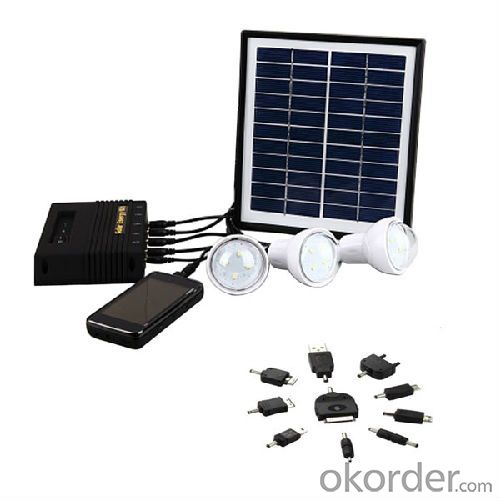
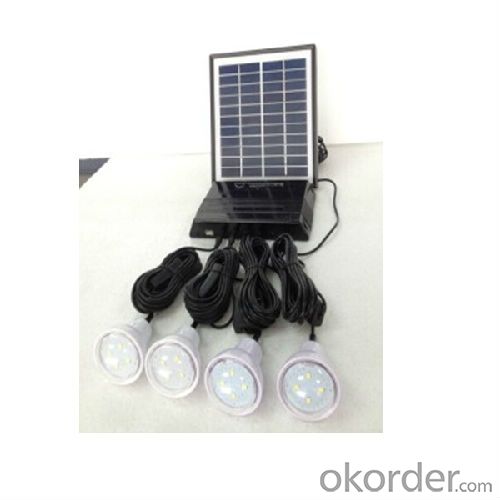
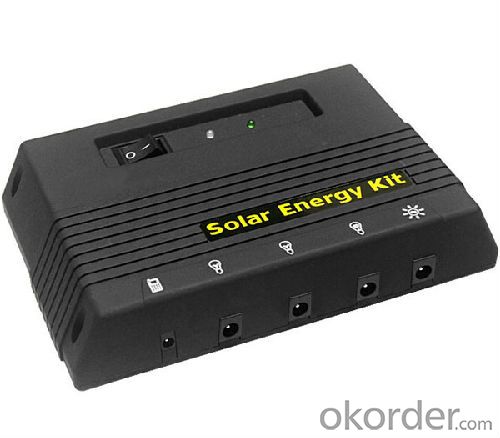
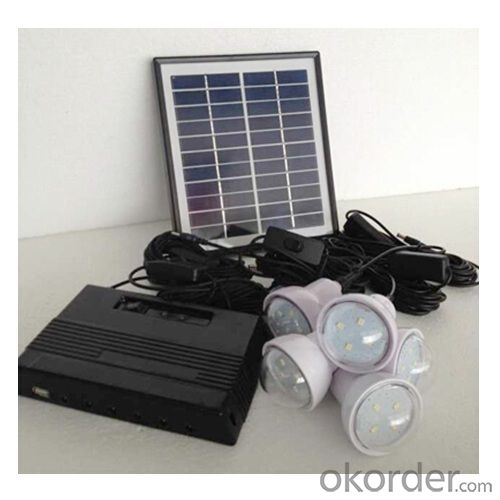
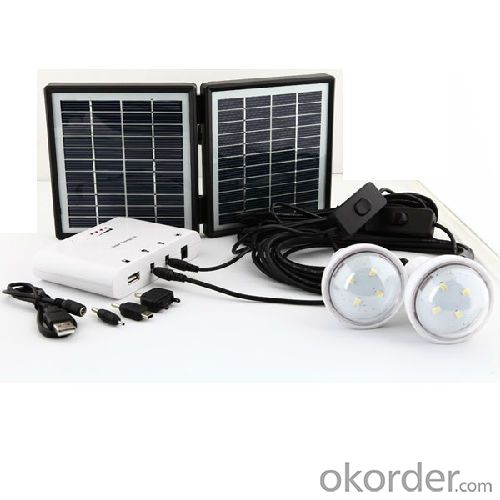
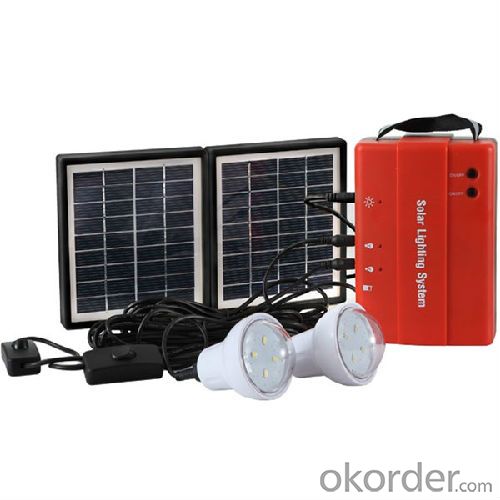
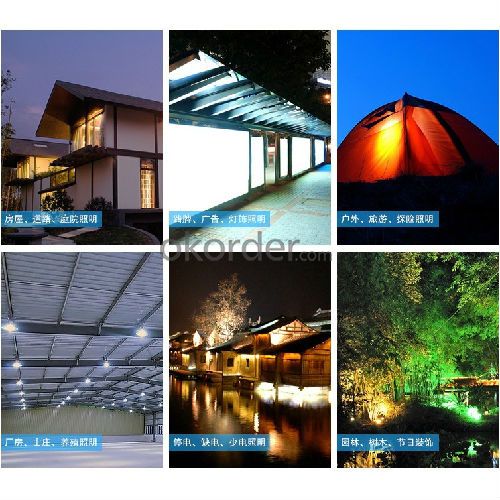
Feature
| battery: 7.4V 4400mAh Lithium battery |
| solar panel: 4W 11V Solar Panel with 5M cable |
| led bulbs: 0.9W LED bulb with 4pcs |
| LED bulb: each with 5M cable and switch on cable, IP54. |
| With LED charging indicator: yes |
| Mobile phone charging: USB port 5V 1000mA output, with 5-in-1 USB mobile charging cable (Nokia 6101,Sumsung G600, Micro USB, Mini USB,Iphone 4/4S) |
| Overcharge and overdischarge protection: yes |
| Rechargeable by AC charger: optional |
| Working hours on full battery: |
| 5 bulbs-6 hours |
| 4 bulbs-7.5 hours |
| 3 bulbs-10 hours |
| 2 bulbs-15 hours |
| 1 bulb-30 hours |
| Full charging time |
| By solar-16 hours (under direct sunshine) |
| By AC charger-about 11 hours |
Usage/Applications
Rural homes, campers, fishermen, outdoor campaigns or activities, etc. Remote area, mountainous area, desert area, grassland area,
Village, country area, Camping, outdoor activities, travel, Lighting at night.
Customized options
1. OEM/ODM available;
2. It's also available to customize your own solar lighting systems, solar lanterns, or any solar lighitng products by giving us solar lights picture / 3D draft / technical datas.
Packing & Delivery
Package:
1* solar panel
1* portable system box
4* LED bulbs with on/off button on cable
inner box size: 335*255*84mm
10pcs/carton
carton size:525*350*450mm
Delivery:
|
Shipping Service |
Estimated Delivery Time |
|
DHL |
2-8 business days |
|
FedEx |
3-8 business days |
|
TNT |
2-10 business days |
|
UPS |
1-7 business days |
|
EMS |
6-14 business days |
|
ePacket |
7-12 business days |
|
China Post Air Mail |
7-15 business days |
|
China Post SAL |
14-30 business days |
|
Air freight |
3-10 business days |
|
By Sea |
30-40 business days |
1. 3-5 business days for Sample Orders; 7-30 business days for Bulk Orders for Bulk Orders.
2. "Business days" means Monday-Friday, excluding holidays.
3. DHL and UPS cannot ship to military or P.O. boxes address
4. The Shipping Service above is for reference only, for any other questions, please feel free to contact us.
Factory
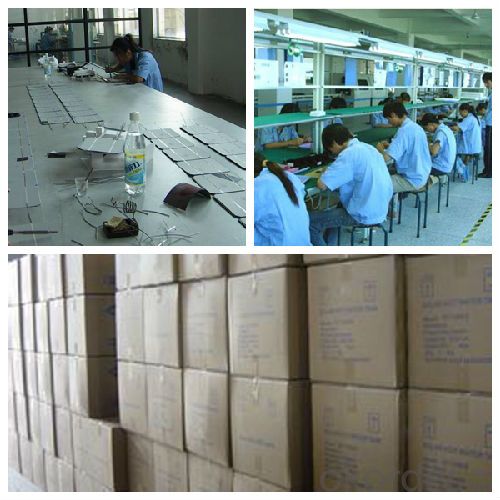
- Q:Can solar energy systems be used in multi-story buildings?
- Yes, solar energy systems can certainly be used in multi-story buildings. They can be installed on rooftops, terraces, or other available open spaces to harness sunlight and generate electricity. In fact, multi-story buildings often have larger roof areas, which can accommodate a greater number of solar panels, allowing for more efficient energy production. Additionally, advancements in solar technology, such as the use of thin-film solar panels, have made it easier to integrate solar systems into the facade and windows of multi-story buildings, further expanding their potential use in these structures.
- Q:What is the role of solar trackers in maximizing energy production?
- Solar trackers play a crucial role in maximizing energy production by optimizing the positioning of solar panels to capture the maximum amount of sunlight throughout the day. These devices automatically adjust the angle and orientation of the solar panels to track the movement of the sun, ensuring that they are always aligned at the optimal angle to receive the most sunlight. By continuously monitoring the sun's position and adjusting the panels accordingly, solar trackers significantly enhance the efficiency and energy output of solar energy systems. The main advantage of solar trackers is their ability to increase the overall energy yield of solar installations by up to 25-35% compared to fixed-tilt systems. As the sun moves across the sky, solar trackers follow its path, allowing the panels to capture sunlight from dawn to dusk, maximizing the duration of exposure to direct sunlight. This extended exposure increases the total electricity generation from the panels, making solar trackers especially beneficial in regions with varying weather patterns, seasonal changes, or areas with limited daily sunshine hours. By continuously adapting to the sun's movement, solar trackers also minimize the impact of shading. Shadows from nearby objects, such as buildings, trees, or even clouds, can significantly reduce the efficiency of solar panels. However, solar trackers can mitigate the effects of shading by adjusting the panels' positioning to avoid or minimize the shadow's impact. This ensures that the solar panels are consistently exposed to direct sunlight, maximizing the energy production potential of the entire system. Furthermore, solar trackers can contribute to reducing the payback period of solar installations. With their ability to generate more electricity, solar trackers enhance the return on investment by increasing the overall energy production and subsequently reducing the time it takes to recoup the initial costs of the system. By optimizing energy production and improving the economic viability of solar installations, solar trackers are playing a crucial role in accelerating the adoption of renewable energy and transitioning towards a sustainable future.
- Q:Can solar energy systems be used in countries with low sunlight availability?
- Yes, solar energy systems can still be used in countries with low sunlight availability. While the efficiency of solar panels may be slightly reduced in areas with less sunlight, solar energy can still be harnessed and utilized. Additionally, advancements in solar technology, such as the use of concentrated solar power and hybrid systems, have made it possible to generate electricity even in regions with limited sunlight.
- Q:Can solar energy systems be used in areas with limited access to backup systems?
- Yes, solar energy systems can be used in areas with limited access to backup systems. Solar energy systems are designed to generate electricity from sunlight, which means they can operate independently without relying on backup systems such as grid power or generators. These systems can store excess energy in batteries, allowing for usage during periods of low sunlight or at night. In remote areas with limited access to backup systems, solar energy can provide a reliable and sustainable source of power.
- Q:Can solar energy systems be used in areas with limited space for ground-mounted installations?
- Solar energy systems can still be used in areas with limited ground space. Instead of traditional ground-mounted installations, alternative options like roof-mounted solar panels or vertical installations can be utilized. Roof-mounted solar panels are particularly popular for homes and buildings with limited ground space. They make use of the available roof area to capture sunlight and generate electricity. Another option is vertical solar panel installations, where panels are mounted on walls or other structures. These vertical installations allow for solar energy generation in tight spaces or even on building facades. Therefore, even in places with limited ground space, solar energy systems can still be effectively utilized through alternative mounting options.
- Q:How do solar energy systems impact the affordability of electricity?
- Solar energy systems can have a significant impact on the affordability of electricity. One of the main benefits of solar energy is that it provides a renewable and abundant source of power. By harnessing the sun's energy, solar systems can generate electricity without relying on fossil fuels, which are subject to price volatility and depletion. This stability in energy costs helps reduce the overall price of electricity. Additionally, solar energy systems can help homeowners and businesses save money on their utility bills. Once installed, solar panels produce electricity at no cost, reducing reliance on grid power and lowering monthly electricity expenses. In some cases, solar energy systems can even generate excess electricity that can be sold back to the grid, further offsetting costs. Moreover, solar energy systems often come with financial incentives and tax credits from governments and utility companies. These incentives can help lower the upfront costs of installing solar panels, making them more affordable for individuals and businesses. As solar technology continues to advance and become more efficient, the cost of equipment and installation has been steadily decreasing, making solar energy systems even more accessible. Overall, solar energy systems positively impact the affordability of electricity by providing a sustainable and cost-effective alternative to traditional power sources. By reducing dependence on fossil fuels, lowering energy bills, and offering financial incentives, solar energy systems play a crucial role in making electricity more affordable for both individuals and society as a whole.
- Q:Can a solar energy system be installed on a hotel or resort?
- Yes, a solar energy system can definitely be installed on a hotel or resort. In fact, many hotels and resorts around the world have already embraced solar energy and have installed solar panels on their rooftops or in their surrounding areas. Solar energy systems can provide numerous benefits to hotels and resorts, including cost savings, reduced environmental impact, and enhanced sustainability initiatives. By harnessing the power of the sun, hotels and resorts can generate clean and renewable electricity to meet a significant portion of their energy needs. This can result in substantial cost savings on electricity bills, especially in sunny regions where solar energy potential is high. Additionally, solar energy systems can help hotels and resorts to reduce their reliance on traditional energy sources, such as fossil fuels, thereby mitigating the risks associated with fluctuating energy costs. Installing solar panels on the roofs or in the open spaces of hotels and resorts is also an effective way to promote environmental sustainability. Solar energy is a clean and renewable source of power that produces no greenhouse gas emissions or air pollutants during operation. By transitioning to solar energy, hotels and resorts can significantly reduce their carbon footprint and contribute to the global efforts in combating climate change and promoting a greener future. Moreover, embracing solar energy can enhance the reputation and attract environmentally conscious guests. Many travelers today actively seek out eco-friendly accommodations that prioritize sustainability practices. By installing a solar energy system, hotels and resorts can showcase their commitment to environmental stewardship and attract a growing market of eco-conscious tourists. In summary, solar energy systems can undoubtedly be installed on hotels and resorts. They offer numerous advantages, including cost savings, reduced environmental impact, and increased appeal to eco-conscious travelers. As the world continues to prioritize renewable energy sources, hotels and resorts can play a vital role in the transition to a sustainable future by embracing solar energy.
- Q:What permits are required to install a solar energy system?
- The permits required to install a solar energy system can vary depending on the location and specific regulations of the area. However, there are generally a few common permits that are required in most jurisdictions. Firstly, a building permit is typically necessary for the installation of solar panels or any structural changes that may be required. This permit ensures that the system is installed safely and meets the building codes and regulations of the area. Secondly, an electrical permit is often required as the installation of a solar energy system involves the connection of electrical components. This permit ensures that the electrical work is carried out by a licensed electrician and meets the electrical safety standards of the area. In addition to these permits, some jurisdictions may also require other specific permits or approvals. For instance, a zoning permit might be necessary to ensure that the installation complies with the local zoning laws and does not violate any height restrictions or setback requirements. It is important to note that the permit requirements and processes can vary greatly, so it is always recommended to check with the local authorities or building department to determine the specific permits required for installing a solar energy system in a particular area. Working with a reputable solar installer or contractor can also be helpful as they are typically familiar with the local permit requirements and can assist in obtaining the necessary permits.
- Q:Can solar energy systems be used for agricultural irrigation?
- Yes, solar energy systems can be used for agricultural irrigation. Solar-powered water pumps and irrigation systems are becoming increasingly popular and cost-effective, enabling farmers to harness renewable energy to pump water from wells, rivers, or reservoirs for crop irrigation. This reduces reliance on fossil fuels and helps mitigate environmental impacts while providing a sustainable solution for agricultural water needs.
- Q:Can solar energy systems be used in areas with high levels of saltwater exposure?
- Yes, solar energy systems can be used in areas with high levels of saltwater exposure. However, it is important to use materials and components that are specifically designed to withstand the corrosive effects of saltwater. This can include using corrosion-resistant coatings on solar panels, using stainless steel or marine-grade aluminum for mounting structures, and implementing proper maintenance and cleaning procedures to minimize the impact of salt buildup on the system.
1. Manufacturer Overview |
|
|---|---|
| Location | |
| Year Established | |
| Annual Output Value | |
| Main Markets | |
| Company Certifications | |
2. Manufacturer Certificates |
|
|---|---|
| a) Certification Name | |
| Range | |
| Reference | |
| Validity Period | |
3. Manufacturer Capability |
|
|---|---|
| a)Trade Capacity | |
| Nearest Port | |
| Export Percentage | |
| No.of Employees in Trade Department | |
| Language Spoken: | |
| b)Factory Information | |
| Factory Size: | |
| No. of Production Lines | |
| Contract Manufacturing | |
| Product Price Range | |
Send your message to us
4w 10w 20w 50w 80w 100w Solar Lighting System With Mobile Charge 4 LED Bulbs 4000mah liion Battery Black CE ROHS
- Loading Port:
- Shenzhen
- Payment Terms:
- TT/LC
- Min Order Qty:
- 100Sets set
- Supply Capability:
- 20000 SETS Per Month set/month
OKorder Service Pledge
OKorder Financial Service
Similar products
New products
Hot products
Related keywords
